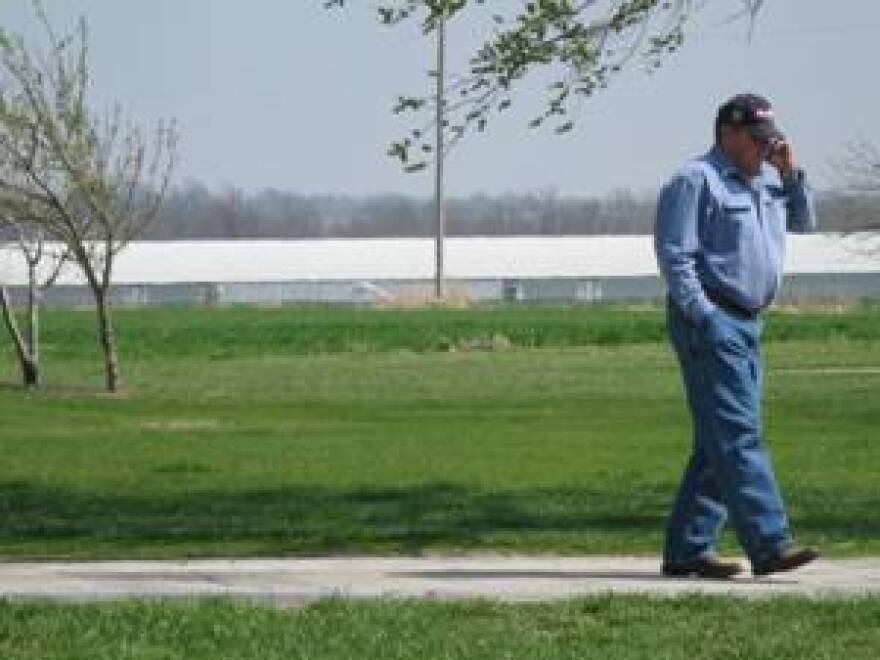http://stream.publicbroadcasting.net/production/mp3/kcur/local-kcur-963427.mp3
Kansas City, Missouri – Should a property owner be able to sue a farmer OVER AND OVER for making the neighborhood smell farmy?
What about for making it unpleasant to work outside?
These are some of the questions at issue as Governor Jay Nixon considers weather to sign a bill legislators sent to his desk last night.
The bill is known informally as The CAFO bill because it deals with what are called Confined Animal Feeding Operations - CAFO's.
Experts say the bill may be the most aggressive in the country in capping damages and limiting the use of the so-called nuisance lawsuit.
The Missouri legislature sent the bill to Governor Jay Nixon Thursday night.
Laws dealing with land and nuisance lawsuits are known as Right to Farm laws, and across the country, states are tinkering with them as agriculture changes.
The general definition of a nuisance is something that "reasonably interferes with the enjoyment and use of your land, and your quality of life."
But what's "reasonable interference?" For that matter, what's"quality of life?" These are legal and philosophical questions.
But not to Darvin Bentledge.
It's very concrete for him. And one recent evening he reflected on these questions after a day's work in his fields. In an emotional recollection of a journal entry he later made, Bentledge says the beautiful afternoon made him nostalgic for earlier days in farming; "You could smell the rain coming in. It's a sweet smell. I hadn't smelled it since they pt the barns in. It was nice to smell what your farm actually smells like."
Bentledge, a sturdy man build like a fire hydrant with the ruddy face of a life outdoors, breaks up with his last words.
He will testify in a jury trial this month as one of 13 plaintiffs suing two large hog producers for "odor nuisance" from more than 6 thousand pigs now living within miles of their homes.
Their claim - the urine and feces, dead animals, and afterbirth remnants that end up in deep pits or lagoons under the barns, and later spread onto nearby fields DO "interfere with the use and enjoyment of their land...and their quality of life."
Paul Stefan, who went to high school with Bentledge,is a part-owner in these hog farms, knows as Confined Animal Feeding Operations, or CAFO'S. Within earshot of 2000 sows nursing their piglets, there's a discernible latrine-like smell.
Stefan admits he may sometimes be immune to the odor. But he says at a barbeque last summer - right where we're standing on his brother - in-law's lawn, that smell was a non-issue; "This is a pristine operation. I believe we try to run this very , very well."
Stefan agreed to talk against the advice of his lawyer because he says he's tired of being vilified for prospering in the community;"I don't like all changes all the time, either. But I'm not ashamed of my involvement in agriculture."
Neither Stefan nor his attorney, Eldon McAfee, would comment on whether the companies'abided by zoning laws or state regulations, or exhausted technical options for addressing odor issues.
Representing the plaintiffs in this case is Charlie Speer, of the Speer Law Firm in Kansas City. A former corporate attorney, Speer, another lawyer, and a battery of paralegals focus only on CAFO cases now. Business is booming- the firm has hundreds of cases in 6 states. In response to allegations he's trying to prosper off the misfortune off the neighbors of CAFO's, Speer says his firm always has a local co-counsel.
The firm won an $ 11 million verdict last year - the latest in a string of court victories - against Missouri's largest producer, Premium Standard Farms-a subsidiary of Smithfield Foods out of Virginia. PSF said at the time it might have to pull out of Missouri if the lawsuits continue.
Sponsors of the Missouri bill are from districts where PSF operations are heaviest, in Northwest region of the state. What the bill says is that jury awards would be limited to the DECREASE IN VALUE a CAFO created on a property. Also, the bill limits the number of times neighbors can sue for the same thing - making a so-called "temporary " nuisance, permanent.
Charlie Speer believes this legislation would take away the incentive for CAFO's to clean up their farms;"Temporary means that the offending party can abate the nuisance. They can clean it up. THe money or damages should influence you to fix the problem, and if (they) don't fix the problem, you can come back and file successive lawsuits until they do."
Those successive lawsuits will suck the agricultural lifeblood out of the state, says Senator Brad Lager, sponsor of the Senate version of the bill. His district, he says, desparately needs the jobs and economic improvements CAFO's like PSF bring to the region; "The reality is that the family farm with 200 head of hogs, that's no longer the world we live in today. And unfortunately, animals sometimes stink, and we're not gonna be able to fix that."
Commodity groups and the Missouri Farm Bureau are supporting the bill; advocates of local control and family farms like the Missouri Rural Crisis Center have worked hard to defeat it.
There is so much ambiguity inherent in this debate, says Rusty Rumley of the National Agriculture Law Center, finding common ground within the agriculture community will be tricky; "It will be really hard to craft a law that takes into account all these different variables- what is agriculture? What is it intended to protect?"
Governor Nixon has supported local control of agriculture in the past , but a spokesman in his office said Thursday night the Governor will be carefully studying this CAFO bill.


